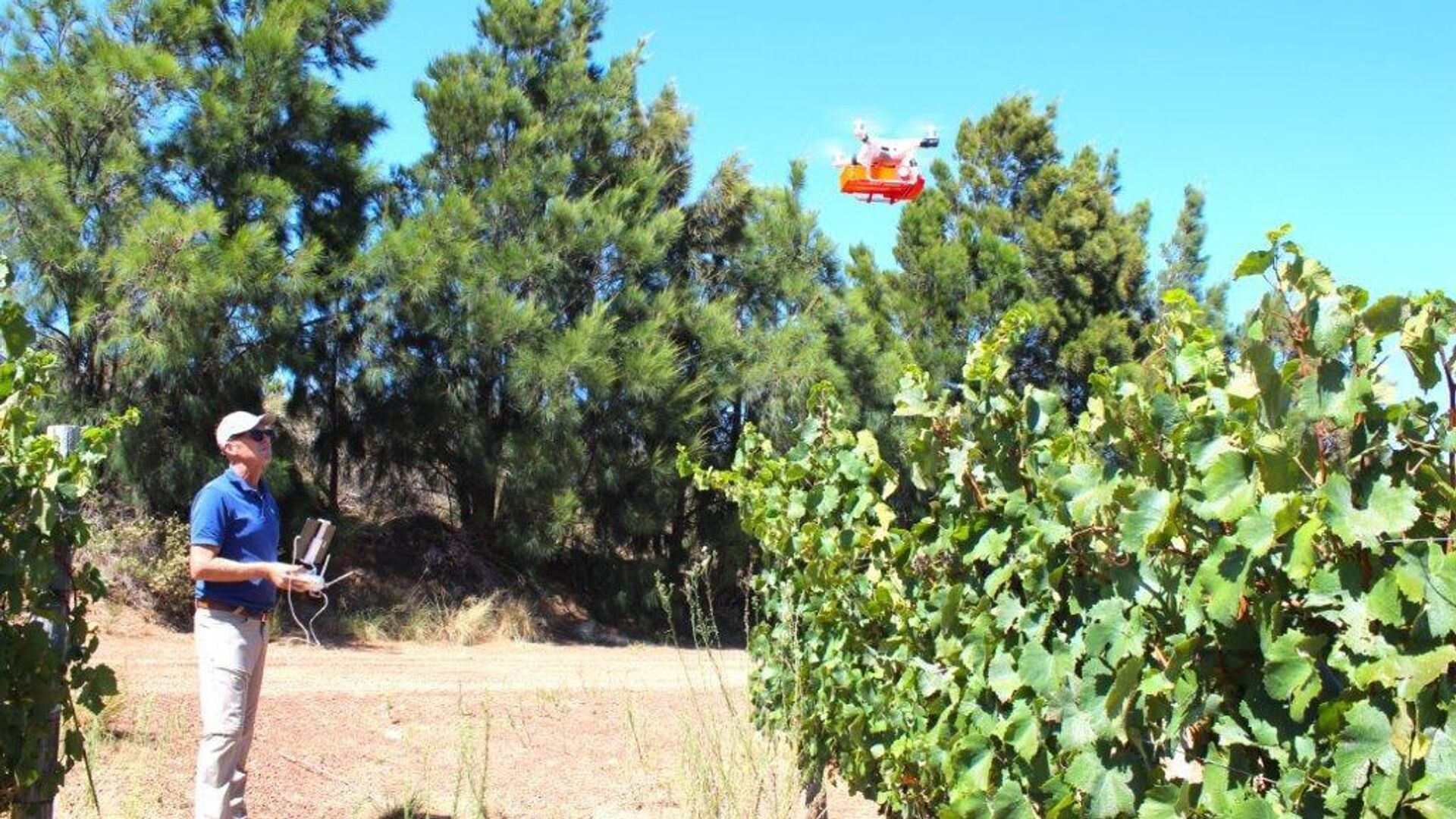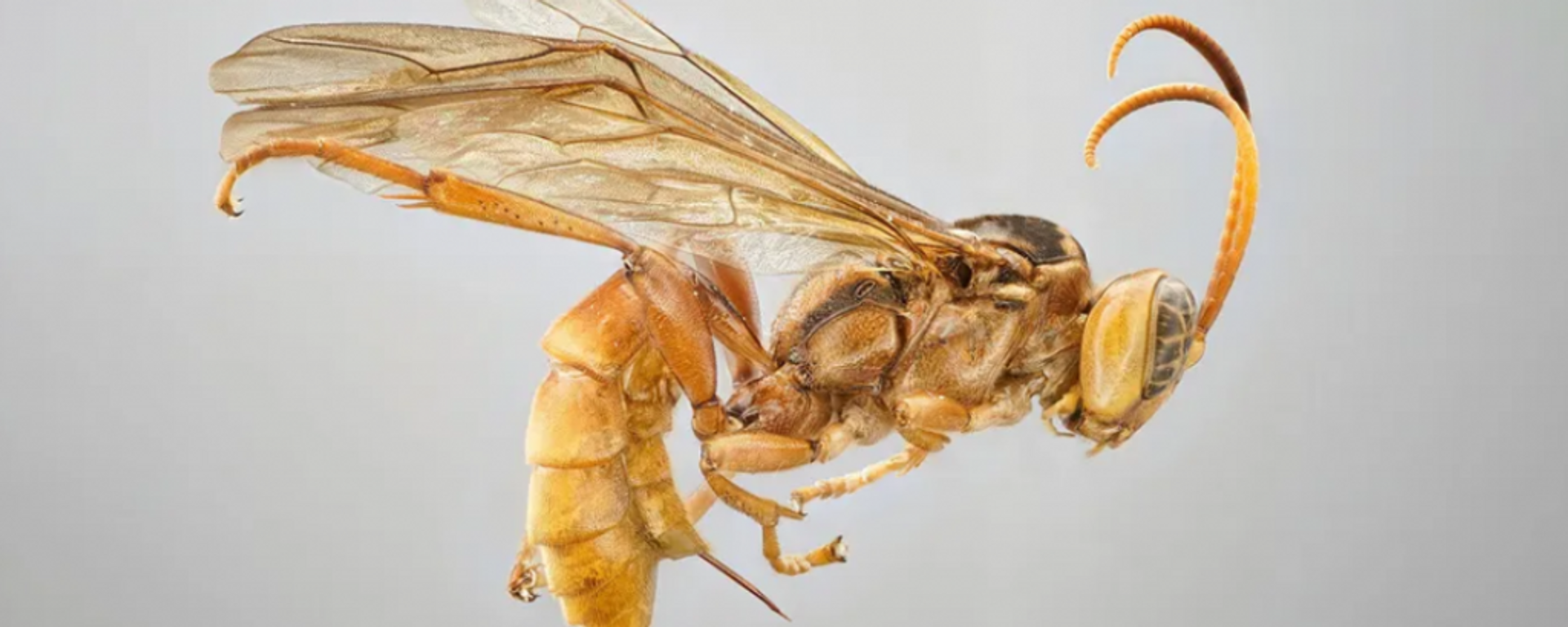https://en.sputniknews.africa/20240829/south-african-vineyard-uses-drones-to-deploy-predatory-wasps-revolutionizing-pest-control-1068052963.html
South African Vineyard Uses Drones to Deploy Predatory Wasps, Revolutionizing Pest Control
South African Vineyard Uses Drones to Deploy Predatory Wasps, Revolutionizing Pest Control
Sputnik Africa
Mealybugs are small insects that are often covered with a white, powdery wax coating. They are pests in vineyards and can cause significant damage to... 29.08.2024, Sputnik Africa
2024-08-29T15:20+0200
2024-08-29T15:20+0200
2024-08-29T16:45+0200
sub-saharan africa
south africa
cape town
southern africa
virus
disease
drones
agriculture
research
science
https://cdn1.img.sputniknews.africa/img/07e8/08/1d/1068054401_0:54:1024:630_1920x0_80_0_0_f900243be854b12ac0513bb6b9bb2ad1.jpg
A prominent South African vineyard, Vergelegen, is using drones to release predatory wasps in a cutting-edge pest control strategy that protects its grape crops from mealybug infestations.The initiative, known as SkyBugs, is a collaboration between FieldBUGS, a Cape Town-based company providing the predatory insects, and Aerobotics, an agritech firm specializing in drone technology. These drones, flying at an altitude of around 30 meters, release 500 Anagyrus wasps per hectare across the vineyard. These wasps, native to South Africa, are a natural enemy of the mealybug, laying their eggs inside the pests and ultimately killing them—a process known as parasitism.This drone-based approach offers several advantages over traditional pest control methods. In a recent interview to a Western media outlet, Matt Davis, head of mapping operations at Aerobotics, said that SkyBugs’ aerial deployment is faster and significantly more cost-effective than spraying insecticides, which can harm the environment and other beneficial insects like pollinating bees. Each drone mission covers approximately 20 hectares, and after each flight, the team collects data through an app to monitor effectiveness.Vergelegen’s viticulturalist, Rudolf Kriel, has reported remarkable success with this method, according to the report. The vineyard has seen the leafroll virus, which previously posed a significant threat, almost entirely eradicated.The vineyard’s collaboration with virologist Gerhard Pietersen, a leading expert on the leafroll virus, has been crucial to this success. Pietersen, who has studied the virus for over two decades, reportedly underscored the importance of controlling the mealybug population to manage the virus. He highlighted that the wasps, being native to the region, pose no risk to the environment and are a sustainable solution to a longstanding problem.This approach is gaining traction beyond vineyards, with farmers growing apples, pears, and citrus fruits also employing drones to release predatory insects for pest control. The success at Vergelegen could inspire more widespread adoption of this technology, potentially transforming agricultural practices across the region and boosting the quality and yield of various crops.By adopting such environmentally friendly, cost-effective methods as SkyBugs, South Africa, one of the world’s top 10 wine producers, not only enhances crop protection but also sets a new standard for sustainable farming in the global wine industry.
https://en.sputniknews.africa/20231014/fly-like-a-bee-sting-like-a-bat-giant-headed-vampire-wasp-discovered-in-the-amazon-1062800242.html
south africa
cape town
southern africa
Sputnik Africa
feedback@sputniknews.com
+74956456601
MIA „Rossiya Segodnya“
2024
Christina Glazkova
https://cdn1.img.sputniknews.africa/img/07e7/0b/07/1063380906_0:0:673:674_100x100_80_0_0_79628b4d0cd9f29291a57aa13bbf9e7a.jpg
Christina Glazkova
https://cdn1.img.sputniknews.africa/img/07e7/0b/07/1063380906_0:0:673:674_100x100_80_0_0_79628b4d0cd9f29291a57aa13bbf9e7a.jpg
News
en_EN
Sputnik Africa
feedback@sputniknews.com
+74956456601
MIA „Rossiya Segodnya“
Sputnik Africa
feedback@sputniknews.com
+74956456601
MIA „Rossiya Segodnya“
Christina Glazkova
https://cdn1.img.sputniknews.africa/img/07e7/0b/07/1063380906_0:0:673:674_100x100_80_0_0_79628b4d0cd9f29291a57aa13bbf9e7a.jpg
south africa, cape town, southern africa, virus, disease, drones, agriculture, research, science
south africa, cape town, southern africa, virus, disease, drones, agriculture, research, science
South African Vineyard Uses Drones to Deploy Predatory Wasps, Revolutionizing Pest Control
15:20 29.08.2024 (Updated: 16:45 29.08.2024) Christina Glazkova
Writer / Editor
Mealybugs are small insects that are often covered with a white, powdery wax coating. They are pests in vineyards and can cause significant damage to grapevines and wineries. By feeding on the plant's sap, mealybugs weaken the vine and can transmit grapevine leafroll-associated viruses, which further reduce the health and yield of the vines.
A prominent
South African vineyard, Vergelegen, is using drones to release predatory wasps in a cutting-edge pest control strategy that protects its grape crops from mealybug infestations.
The initiative, known as SkyBugs, is a collaboration between FieldBUGS, a Cape Town-based company providing the predatory insects, and Aerobotics, an agritech firm specializing in drone technology. These drones, flying at an altitude of around 30 meters, release 500 Anagyrus wasps per hectare across the vineyard. These wasps, native to South Africa, are a natural enemy of the mealybug, laying their eggs inside the pests and ultimately killing them—a process known as parasitism.
This drone-based approach offers several advantages over traditional pest control methods. In a recent interview to a Western media outlet, Matt Davis, head of mapping operations at Aerobotics, said that SkyBugs’ aerial deployment is faster and significantly more cost-effective than spraying insecticides, which can harm the
environment and other beneficial insects like pollinating bees. Each drone mission covers approximately 20 hectares, and after each flight, the team collects data through an app to monitor effectiveness.
Vergelegen’s viticulturalist, Rudolf Kriel, has reported remarkable success with this method, according to the report. The vineyard has seen the leafroll virus, which previously posed a significant threat, almost entirely
eradicated.The vineyard’s collaboration with virologist Gerhard Pietersen, a leading expert on the leafroll virus, has been crucial to this success. Pietersen, who has studied the virus for over two decades, reportedly underscored the importance of controlling the mealybug population to manage the virus. He highlighted that the wasps, being native to the region, pose no risk to the environment and are a sustainable solution to a longstanding problem.
This approach is gaining traction beyond vineyards, with
farmers growing apples, pears, and citrus fruits also employing drones to release predatory insects for pest control. The success at Vergelegen could inspire more widespread adoption of this technology, potentially transforming agricultural practices across the region and boosting the quality and yield of various crops.
By adopting such environmentally friendly, cost-effective methods as SkyBugs, South Africa, one of the world’s top 10 wine producers, not only enhances crop protection but also sets a new standard for sustainable farming in the global wine industry.



